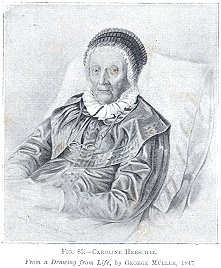Caroline Herschel
Today, a quiet lady maps the heavens. The University of Houston's College of Engineering presents this series about the machines that make our civilization run, and the people whose ingenuity created them.
 William and Caroline Herschel were brother and sister, born in 1738 and 1750 in Hanover. Both were trained as musicians, and William moved to England when he was 19 to find work as an organist.
William and Caroline Herschel were brother and sister, born in 1738 and 1750 in Hanover. Both were trained as musicians, and William moved to England when he was 19 to find work as an organist.
Caroline's father assured her that she was was not pretty enough to marry, and her mother discouraged her bookishness. Her brother rescued her from all that in 1772 and brought her to England, where he'd become a well-established musician.
William turned her loose to study, and study she did. She learned English, more music, mathematics and accounting, and together they studied astronomy. William also forced her to learn the artifices of English society. She complained that English flower shows were:
a subject on which the wondrous female mind ... for months before and after, is absorbed in ecstatic contemplation.
Within a few years Caroline was making her own way as a professional singer. But she and William were more and more seriously involved with astronomy. By 1774 William had built his own state-of-the-art telescope, and together the two of them set out to map the heavens. By 1781 he'd discovered the planet Uranus. The next year he was made King George's court astronomer.
Five years later, Caroline, then 36 years old, was added to the payroll. At first she was his backup mathematician, but she soon was functioning as an equal partner. Long before she received any salary, she'd discovered 14 new nebulae, including Andromeda and Cetus. She was the first woman to discover a comet, and before she was done she'd identified eight of them.
But the full sweep of Caroline Herschel's work is even grander than that. William died when she was 72, and she went right on ordering a vast accumulation of astronomical data. No error has ever been reported in her computerlike calculations. When she was 75, the Royal Astronomical Society voted her a gold medal for her catalog of 1500 nebulae. Her last honor was the King of Prussia's gold medal for science, awarded on her 96th birthday. She died shortly before her 98th birthday in 1848.
All her life, Caroline took elaborate care to deflect credit toward William. He was, beyond any doubt, one of the great geniuses of the 18th century and by all accounts a thoroughly decent man. His sister's self-effacing brilliance takes nothing from that. But he was quick to acknowledge what the world was slow to see -- that Caroline Herschel, this selfless lady whom we hardly know today, was also a giant in the field of astronomy.
I'm John Lienhard, at the University of Houston, where we're interested in the way inventive minds work.
(Theme music)
Osen, L., Women in Mathematics. Cambridge, MA: MIT Press, 1974, pp. 71-81.
Caroline Herschel's epitaph, which she composed herself, is quoted in Scripta Mathematica, Vol. 21, June 1955, p. 251:
Here rests the earthly veil of
Caroline Herschel
Born at Hanover, March 16, 1750
The eyes of her who passed to glory, while below turned to the starry heavens; her own discoveries of the comets and her share in the immortal labours of her Brother, William Herschel, bear witness of this to later ages. The Royal Academy of Dublin and the Royal Astronomical Society of London numbered her among their members. At the age of 97 years and 10 months she fell asleep in happy peace, and in full possession of her faculties; following to a better life her father, Isaac Herschel, who lived to the age of 60 years 7 months and lies buried near this spot since the 25th March, 1767.